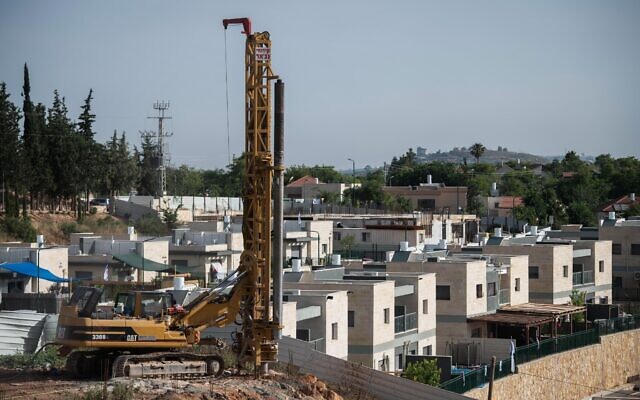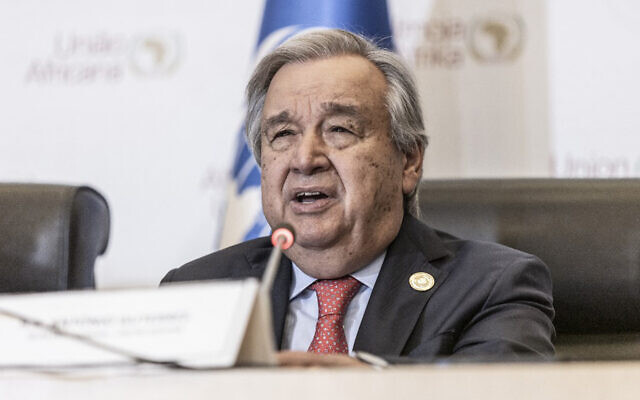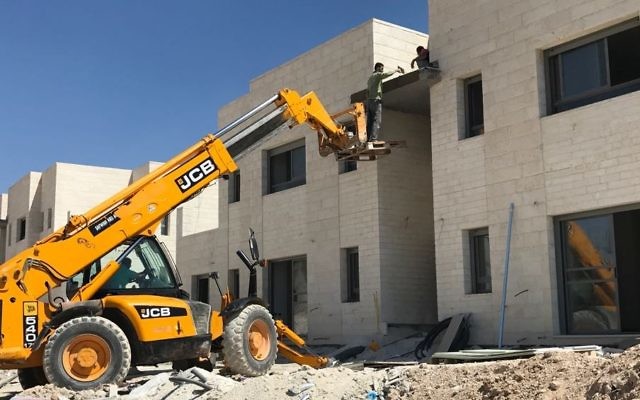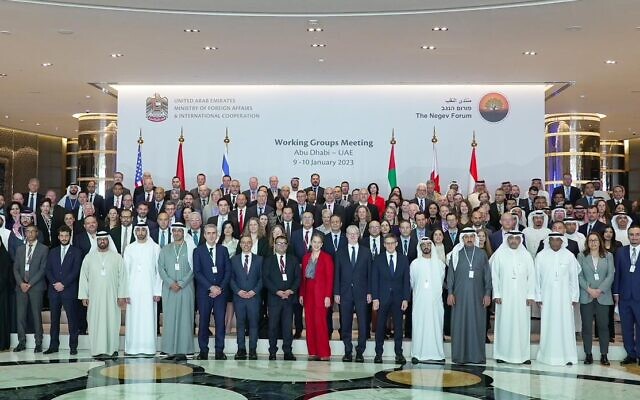UN chief ‘troubled, alarmed’ by Israeli decisions to beef up settlement building
Guterres says settlements driving violence, urges Jerusalem to halt expected approval of over 4,000 homes and reverse resolution handing Smotrich control of West Bank planning

United Nations Secretary-General Antonio Guterres is “deeply troubled” after Israel gave a pro-settlement minister control of planning procedures in the West Bank and approved over 4,000 new homes there, his office said Monday.
On Sunday, Prime Minister Benjamin Netanyahu’s government passed a controversial resolution that gives practically all control over planning approval for construction in West Bank settlements to Finance Minister Bezalel Smotrich, a settler himself and an impassioned advocate of the nationalist movement.
The announcement came hours after Smotrich said plans for 4,560 new settlement homes would go up for approval before a defense ministry planning body next week.
In a statement, Guterres excoriated Israel’s West Bank settlements as “a significant driver of tensions and violence.”
“The Secretary-General is deeply troubled by yesterday’s decision by the Israeli Government to amend settlement planning procedures,” the statement read. “The changes can be expected to expedite the advancement of Israeli settlement plans in the occupied West Bank, including East Jerusalem.”
“He is also deeply alarmed by the anticipated advancement next week of over 4,000 settlement housing units by Israeli planning authorities,” the statement added.
The decision approved at Sunday morning’s cabinet meeting, which takes immediate effect, will dramatically expedite and ease the process for expanding existing West Bank settlements and retroactively legalizing some illegal outposts.

According to the resolution, which is an amendment to a 1996 government decision, the numerous stages of authorization hitherto needed from the defense minister for the approval of land usage designation masterplans will be reduced to just one required signature. And, in line with a previous agreement, that approval will now come from Smotrich in his secondary role as a minister within the Defense Ministry in charge of settlement affairs.
Guterres urged Israel to “halt and reverse” the decisions, calling settlements “a flagrant violation of international law” and “a major obstacle to the realization of a viable two-State solution.”
Earlier in the day, UN Special Coordinator for the Middle East Peace Process Tor Wennesland warned that Israel’s moves were liable to increase friction.
“At a time of increased violence and fragility on the ground, the prolonged absence of a political process, and concerted international and regional efforts to support constructive dialogue between the parties, such steps only push Israelis and Palestinians further apart and risk destabilizing an already highly tense situation on the ground,” he said.
The announcements were also pilloried by the US State Department, which said Sunday that it was “deeply troubled” by settlement construction in the West Bank, which Washington branded as an “obstacle to peace.”
A majority of the 4,560 units up for approval will be located in Jewish communities located deep in the West Bank, east of the security barrier in what will further complicate efforts to create a contiguous, viable Palestinian state.

Like the US, Guterres urged Israel to take concrete steps in line with agreements made at recent US-brokered regional summits in Aqaba, Jordan, and Sharm el-Sheikh, Egypt.
At the meetings, Israeli and Palestinian representatives committed to taking steps to calm tensions amid intensifying violence in the West Bank. Jerusalem specifically agreed to hold off on advancing plans for new settlement homes for four months and to not legalize any new outposts for six months.
While the international community considers all settlements illegal, Israel differentiates between settlement homes built and permitted by the Defense Ministry on land owned by the state, and illegal outposts built without necessary permits, often on private Palestinian land.

Next week’s Defense Ministry meeting to advance new construction will come just as the four-month moratorium expires. Just before it began, Israel green-lit a record high of 10,000 settlement homes in addition to legalizing at least nine outposts, drawing massive international uproar and a joint statement of condemnation from the UN Security Council.
Israel argues that it technically has not violated the commitments it made in Aqaba and Sharm el-Sheikh, but it has green-lit construction in East Jerusalem and also illegally transferred a yeshiva in the northern West Bank, in what will make way for the legalization of the Homesh outpost.
The US has been seeking to hold a third gathering of Israeli, Palestinian, Egyptian, and Jordanian officials in order to extend the parties’ commitments to holding off on advancing unilateral measures, but the sides have yet to nail down a date.
The PA announced Monday that in response to the pair of Israeli decisions, it would be boycotting a meeting between Israeli and Palestinian finance officials that was supposed to take place on Monday. It was supposed to be the first gathering of the Oslo Accords-mandated Joint Economic Committee since 2009 and the Biden administration has been working for over a year to get the gathering nailed down.
Israel typically advances plans for new settlement construction every three to six months depending on the degree of international pressure. It notified Biden officials last week that it would be doing so again at the end of the month.
Earlier this month, Netanyahu delayed plans to advance the highly controversial E1 settlement project amid US pressure. The subsequent plan to move forward with thousands of settlement homes elsewhere appears to be an effort to placate Netanyahu’s coalition partners.

But the approvals could also hamper efforts to hold a second Negev Forum ministerial summit. Morocco was supposed to host the gathering in March, but it has held off from finalizing a date amid escalating tensions between Israelis and Palestinians as well as discomfort with the hardline Israeli government.
Sunday’s announcements came while US Assistant Secretary of State Barbara Leaf was kicking off another round of shuttle diplomacy in Jerusalem, Ramallah and Amman this week for talks with senior Israeli, Palestinian and Jordanian officials on West Bank tensions, the Abraham Accords and the Iran nuclear threat.









